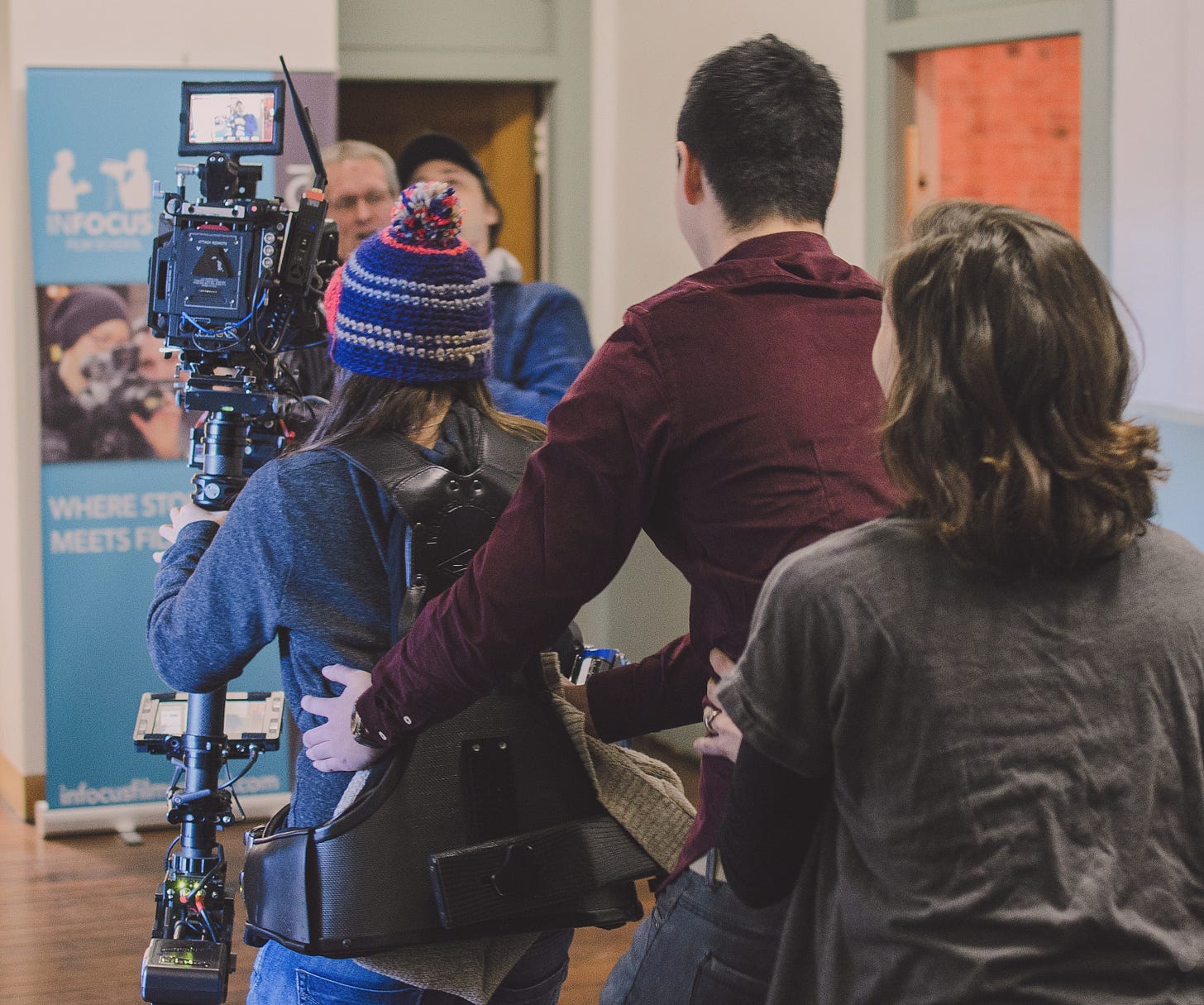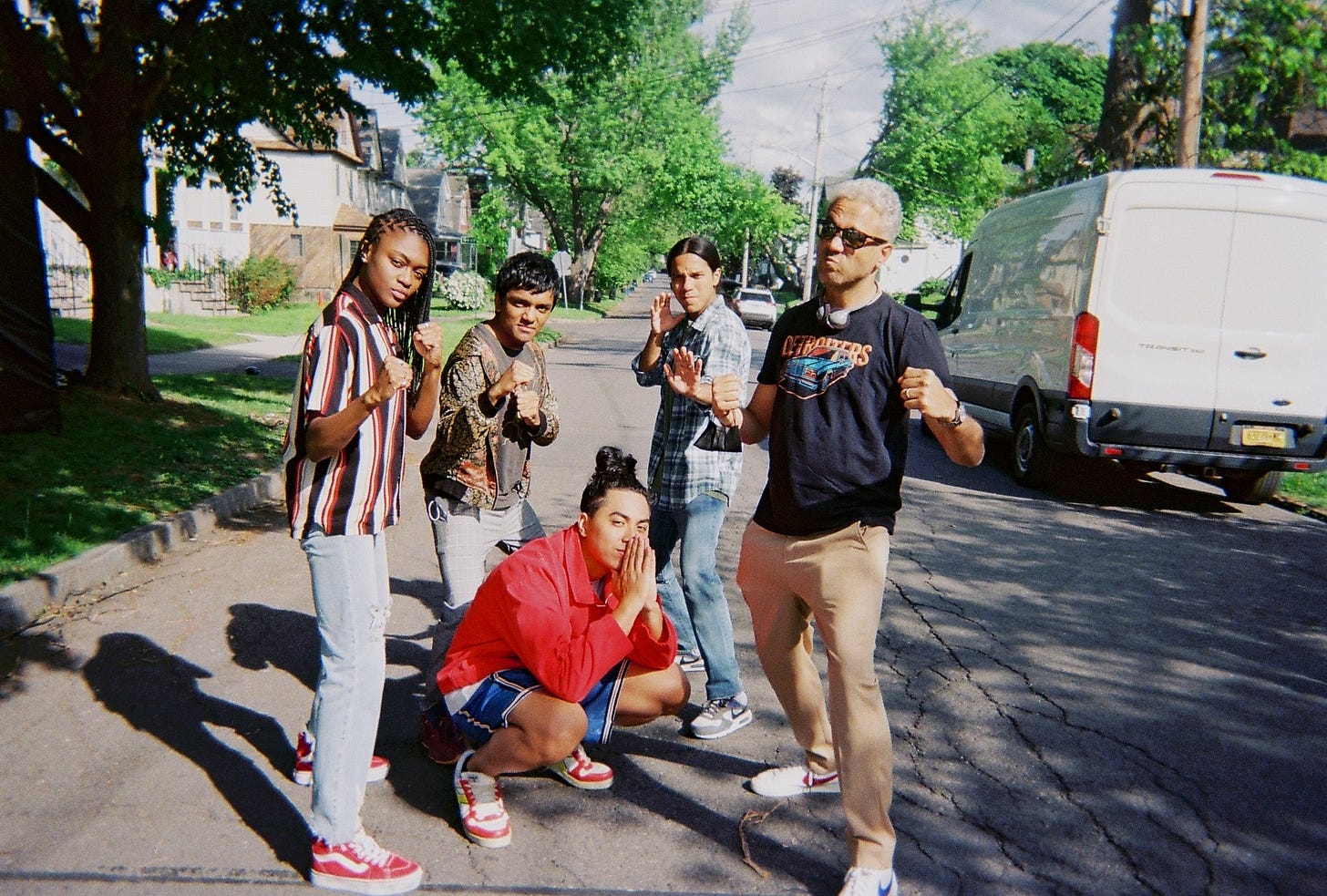Hello friends!
Art In All Its Forms is back in action. I’m making a switch to sending content to your inbox on every Monday (plus some bonus stuff every once in a while). Life has shifted so much since I started this little project during the pandemic. While the quantity of my output will be less than before — only weekly and more newsletter-focused — I will hopefully be sending you quality material on the arts and how they interact with your daily life. Let’s get to it.
Being in a movie
From mid-May to the end of June, I was shooting a new comedy feature film for Hulu called Miguel Wants to Fight!
From the Deadline article:
The film centers on Miguel (Flores), a 17-year-old who asks his three best friends to help him get in his first fight ever before he moves to a new city. It stems from Hulu’s partnership with American High, which has also seen the release of titles including Big Time Adolescence, Plan B, Crush and The Binge.
It was truly a joy to shoot this and to play one of the main characters in such a meaningful story. The cast and crew were brilliant, and I can’t wait for this to come out (release is TBD, maybe early next year?).
I wanted to give you a few insider takeaways from shooting this film (NO SPOILERS HERE). It should give you a first-person, honest, and sincere perspective of what it’s like to be on a film set and what it takes to get the performances we all love onto the big screen (it’s mostly lots of small screens at this point, let’s be honest).
*****
1. We get paid to be funny at 1am
On this film, sometimes we worked odd 12-hour days (like going from 2pm - 2am). We do this for any number of reasons, including availability of the shooting location and hours of available sunlight or darkness. As one might imagine, those late night hours can be tricky and tiring.
But, as an actor, your job is to be ON when the camera is ON. And that’s much more difficult than it seems. Imagine you’re shooting a scene starting at 10pm. After doing the scene fifty times — in the wider shots and in some of the coverage (where the camera focuses on each character individually), they finally get to your closeup… at 1am.
You’ve said your joke in the scene, like, so many damn times. But it doesn’t matter. This next time is the one that’s going to count. In a year, when the movie comes out, everyone will see this 1am joke… and GO. That’s what an actor really gets paid for. To manage that day appropriately, to stay loose and fresh, to be ready for that moment, and to DELIVER.
2. Emotional management
It’s funny to me how confusing emotions can be for an actor on a set. You’re one of the leads in a film, yet a minor note from a fellow actor or the director can send you on a self-destructive emotional tailspin if you’re not careful. The dynamics of being in front of a camera all day long are very weird… your ego and vanity can get involved without you even noticing them.
A small note from the director might be: “Hey, that was great. Can we try that line again? Maybe it’s a little more heated.” In the actor’s mind, it turns into: “That was absolutely terrible. You barely deserve to be here on this set. Get angrier, or you’re fired.”
I watched these moments happen in my mind every so often, and I had to make an effort to slow down, remind myself of my worth, and take each note as exactly what it was — a small adjustment to make things work better.
It helps when you have trust in your director and cast. In my case, they were always supportive and generous. But also honest and willing to take and give notes as needed. It felt like a true collaboration, where we could comfortably set our egos aside and work on a story together. That’s all you can ask for.
3. Being decisive when it counts
A scene can play out a thousand different ways. Only one way can end up in the film. A good director sees a version of the movie in their mind and then executes the shoot in such a way as to make that “imagined film” real. There may be changes on the way, adjustments to make in service of a clearer story or a more dramatic climax. But, at the end of the day, a director must know what they want. And — this next part is crucial — when they get that take that’s perfect, they should KNOW they got it and MOVE ON.
There’s nothing worse than being directed by someone who is indecisive about the direction of the film shoot. I’m lucky to say that with my director, Oz Rodriguez, we NEVER had that problem. Oz is a veteran of SNL, so he’s an expert at getting GREAT results under time pressure. It was such a gift to be directed by him.
As an actor, it made for an easy day. I go in, I know the material, and I give my take on it. I know that Oz will look at it, give me the appropriate notes or suggestions, and let me do my job. When he gets the performance he wants, he’ll say, “That was great, we got it.” I can wipe my hands of it and think about the next fictional moment I have to participate in. I go home and sleep easy, fully trusting in Oz’s vision for the film. I can’t wait to see that vision soon.
4. Out-of-the-way kindness
Some days, there are over one hundred and fifty people on set: the cast, the crew, and the background actors together.
I remember one scene we shot that required around fifty background actors, all moving together in a coordinated manner in and out of a “school.” Meanwhile, four of us, the main cast members, navigated through them and acted the scene. And, to top it all off, multiple camera operators had to shoot the whole scene, which required another level of choreography. The scene demanded immense effort and concentration from every one of us.

When we finished that scene, everyone breathed a sigh of relief… “We got it.” And we all start to move on to the next scene. At that moment, I felt compelled to thank everyone. The background actors, for creating a realistic high school environment — I felt like I was back in school again. The crew, for capturing that moment. The cast, for sharing that moment with me on screen. And so, I went around and thanked people. It felt good.
It’s easy to convince yourself not to do that… to not be too sentimental or over-the top. But, consistently on this film set, I had this thought race into my mind: “Making moves is so f****** awesome.”
I’m so lucky to get to do this for a living. As an actor in this film, I felt a tremendous responsibility to create that same positive and magical environment for everyone. I hope I contributed to that; in my view, that responsibility was as important as helping produce a fantastic final product on-screen.



